Grandpapa fell down a drain;
Couldn’t scramble out again.
Now he’s floating down the sewer
There’s one grandpapa the fewer.
— Harry Graham
Grandpapa fell down a drain;
Couldn’t scramble out again.
Now he’s floating down the sewer
There’s one grandpapa the fewer.
— Harry Graham
If there were, O! an Hellespont of cream
Between us, milk-white Mistress, I would swim
To you, to show to both my love’s extreme,
Leander-like, — yea, dive from brim to brim.
But met I with a butter’d pippin-pie
Floating upon’t, that would I make my boat,
To waft me to you without jeopardy:
Though sea-sick I might be while it did float.
Yet if a storm should rise, by night or day,
Of sugar snows or hail of care-aways,
Then if I found a pancake in my way,
It like a plank should bear me to your quays,
Which having found, if they tobacco kept,
The smoke should dry me well before I slept.
— John Davies of Hereford, 1598
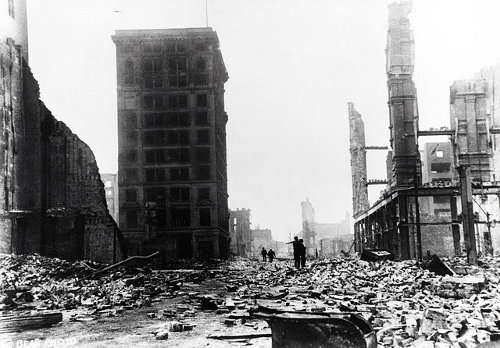
One last, almost unbelievable, anecdote from the San Francisco earthquake:
When the quake struck at 5:12 a.m., William Stehr was in his room on the top floor of the Nevada House at 132 Sixth Street. At first he considered jumping from his window onto a roof below, but “as I was waiting to make up my mind the house I was looking at collapsed with a deafening roar.” He was dressing himself hurriedly when he heard another crash and saw that the Brunswick House had also collapsed “and was tumbling into a heap of ruins in a smother of dust.” He leapt to his door but found that the quake had jammed it shut.
As I was tugging at it I felt the floor tilting and sinking under me, and I knew that the house was going down like the others. So I hung on instinctively to the door handle while the whole floor dropped. As it sank I felt three distinct bumps as the lower floors collapsed in turn under the weight of the roof and the top story. With each bump came a frightful crash and cracking of timbers and glass and the cries of other people in the house who were being destroyed. …
The cries of these people who were being killed, especially the women, were dreadful to hear; even to me, in my own peril, thinking every instant that I would be crushed, they were the most dreadful part of the experience.
Then came another bump, very sudden and very severe. The place fell in on top of me, the breath seemed to be knocked out of my body and I went unconscious.
He had survived. Of the 50 people in the Nevada, only seven had escaped. “On all sides, where the Nevada, the Ohio, the Brunswick and other lodging houses had been, there was nothing but a big pile of debris.”
(From Malcolm E. Barker’s Three Fearful Days, 1998.)
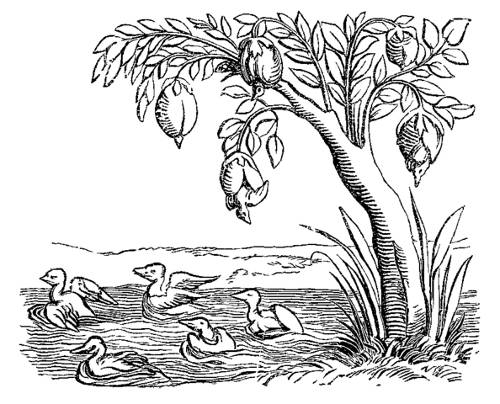
anatiferous
adj. producing ducks or geese
A deservedly rare word; it arises from the medieval belief that the barnacle goose (Branta leucopsis) grew underwater, emerging from barnacles that fell from trees. In his Topographia Hibernica of 1188, Welsh monk Giraldus Cambrensis wrote:
There are likewise here many birds called barnacles,(barnacle geese) which nature produces in a wonderful manner, out of her ordinary course. They resemble the marsh-geese, but are smaller. Being at first, gummy excrescenses from pine-beams floating on the waters, and then enclosed in shells to secure their free growth, they hang by their beaks, like seaweeds attached to the timber. Being in progress of time well covered with feathers, they either fall into the water or take their flight in the free air, their nourishment and growth being supplied, while they are bred in this very unaccountable and curious manner, from the juices of the wood in the sea-water. I have often seen with my own eyes more than a thousand minute embryos of birds of this species on the seashore, hanging from one piece of timber, covered with shells, and, already formed.
Apparently the belief arose because these geese were never seen to nest like other birds; it was not yet understood that birds migrate.
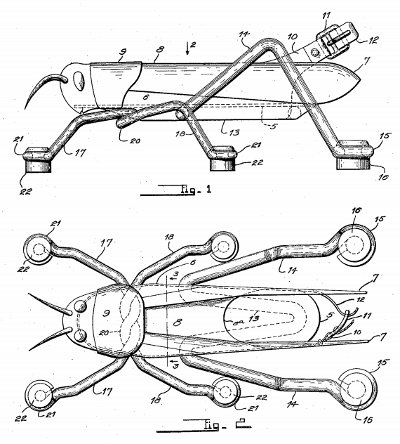
George and May Southgate patented these rather alarming “jumping shoes” in 1922. Each is a giant replica of Schistocerca americana made of spring steel and secured by a strap over a child’s shoe.
“He will spring or jump much farther than he would be able to without our improved device; and furthermore, the shock upon the system when alighting will be greatly reduced, thus enabling the user to cover considerable ground with a minimum effort.”
This will all end in litigation, but in the meantime “the flapping of the wings will greatly increase the enjoyment of the users.”
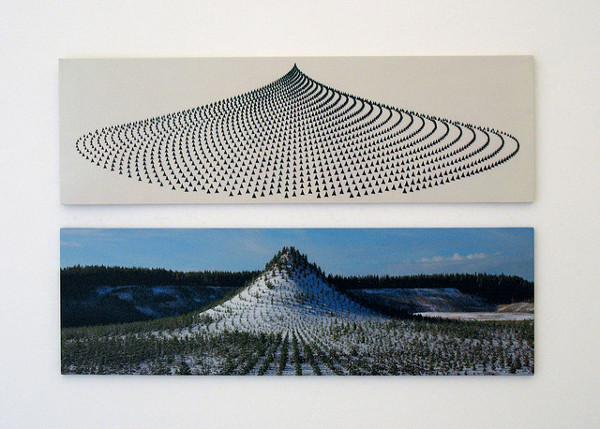
Twenty years ago, 11,000 people planted 11,000 trees on an artificial mountain near Ylöjärvi, Finland. The trees were planted in a mathematical pattern based on the golden section; in time they will grow into a virgin forest each tree of which has a designated custodian. The trees can change ownership, but they can never be removed from the forest, and the mountain itself can never be owned or sold.
Artist Agnes Denes conceived the project in 1982, and the Finnish government undertook it 10 years later. The site is legally protected for the next 400 years.
In 1993, I attended a technology and art conference, ‘Ars Electronica,’ in Linz, Austria, where my former postdoctoral student Pattie Maes gave a talk titled ‘Why Immortality Is a Dead Idea.’ She took as many people as she could find who had publicly predicted downloading of consciousness into silicon, and plotted the dates of their predictions, along with when they themselves would turn seventy years old. Not too surprisingly, the years matched up for each of them. Three score and ten years from their individual births, technology would be ripe for them to download their consciousness into a computer. Just in the nick of time! They were each, in their own minds, going to be remarkably lucky, to be in just the right place at the right time.
— MIT roboticist Rodney Brooks, Flesh and Machines, 2003
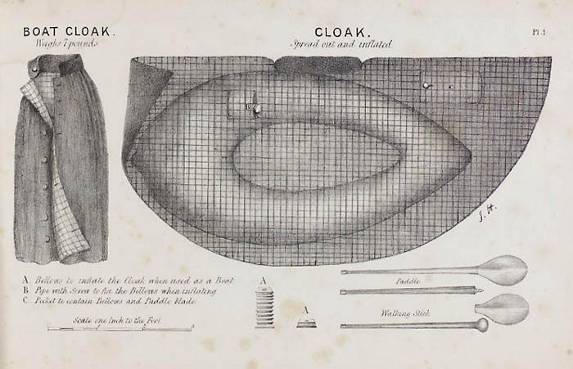
Royal Navy officer Peter Halkett designed this lightweight “boat cloak” in 1844. When deflated, its hull could be worn as a cloak, the oar used as a walking stick, and the sail as an umbrella, but a portable bellows could inflate it in four minutes into a craft that could carry eight people.
Explorer John Richardson, who had nearly died of hypothermia trying to cross an arctic river during John Franklin’s disastrous Coppermine Expedition of 1819, wrote that “Had we been possessed of such a contrivance in our first expedition, I have little doubt of our having brought the whole party in safely.” But the navy saw no use for Halkett’s boats, and his efforts to promote them to outdoorsmen similarly failed. The two remaining specimens reside in museums.
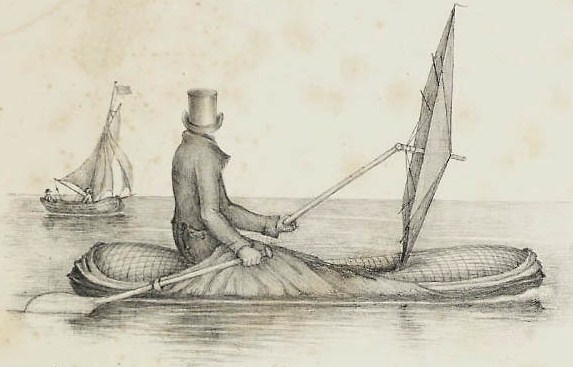
He never completed his History of Ephesus,
But his name got mentioned in numerous prefaces.
— W. Craddle